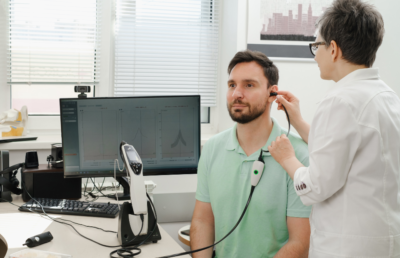While hearing aids are great for resolving hearing issues of most people with hearing loss, they are unfortunately insufficient for helping certain more severe cases. In these situations, a cochlear implant may be able to help. But not many people are aware of the benefits of cochlear implants—by one estimate, only 5% of U.S. adults who might benefit from a cochlear implant have one.
What is a cochlear implant?
A cochlear implant works differently than a hearing aid as it is implanted in your ear. An electrode array in the cochlear area of the inner ear stimulates the auditory nerve. Unlike hearing aids, which simply amplify the signal in order to work with damaged parts of the ear, the cochlear implant bypasses the parts of the ear that are damaged and goes straight for the auditory nerve and sends an electric signal directly to the auditory nerve, which helps with clarity and with more nuanced types of hearing such as speech recognition.
A microphone and transmitter sits on the outside of the ear, collecting sound from the environment and sending it to the transplant in the inner ear.
Who is a Good Candidate
There are two main factors that make someone a good candidate for a cochlear implant: moderate to profound hearing loss in both ears, and limited benefit from binaural amplification such as that provided by hearing aids. Candidates can be as young as 12 months of age. For adults, even those with moderate hearing loss can be good candidates as long as they have Limited benefit from amplification defined by preoperative test scores of ≤ 50% sentence recognition in the ear to be implanted and ≤60% in the opposite ear or binaurally.
What does a Cochlear Implant Sound Like?
Learning to hear again with a cochlear implant is a process. According to the Johns Hopkins School of Medicine website, “Initially, the most commonly reported sound qualities are described as “mechanical,” “robotic,” “cartoonish” and like people are “talking with marbles in their mouth.” Some patients will only “feel” the stimulation when it is first turned on.”
Over time, as your brain learns to get used to the new input, the inputs get normalized and everything starts to sound much more normal. Usually, this adjustment process takes between six and twelve months. And, let’s not forget, any amount of residual “weirdness” in the hearing process pales in comparison with the alternative, which is not to be able to hear at all.
Insurance Coverage
There’s one bit of good news for patients who are good candidates for a cochlear implant: unlike hearing aids, which are typically not covered by health insurance, cochlear implantation is covered for appropriate candidates by most private health insurance plans, and Medicare and Medicaid.
Think you or a loved one might be a good candidate for a cochlear implant? It all starts with a hearing test, so contact us today to schedule your hearing appointment!




